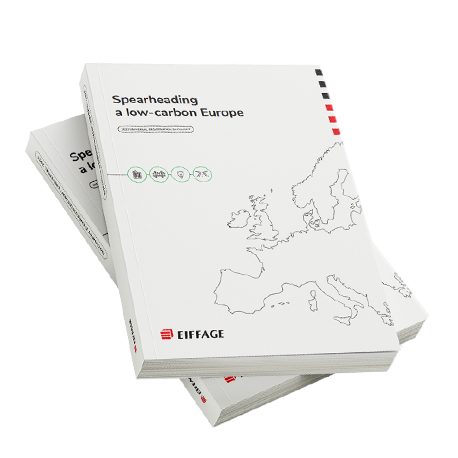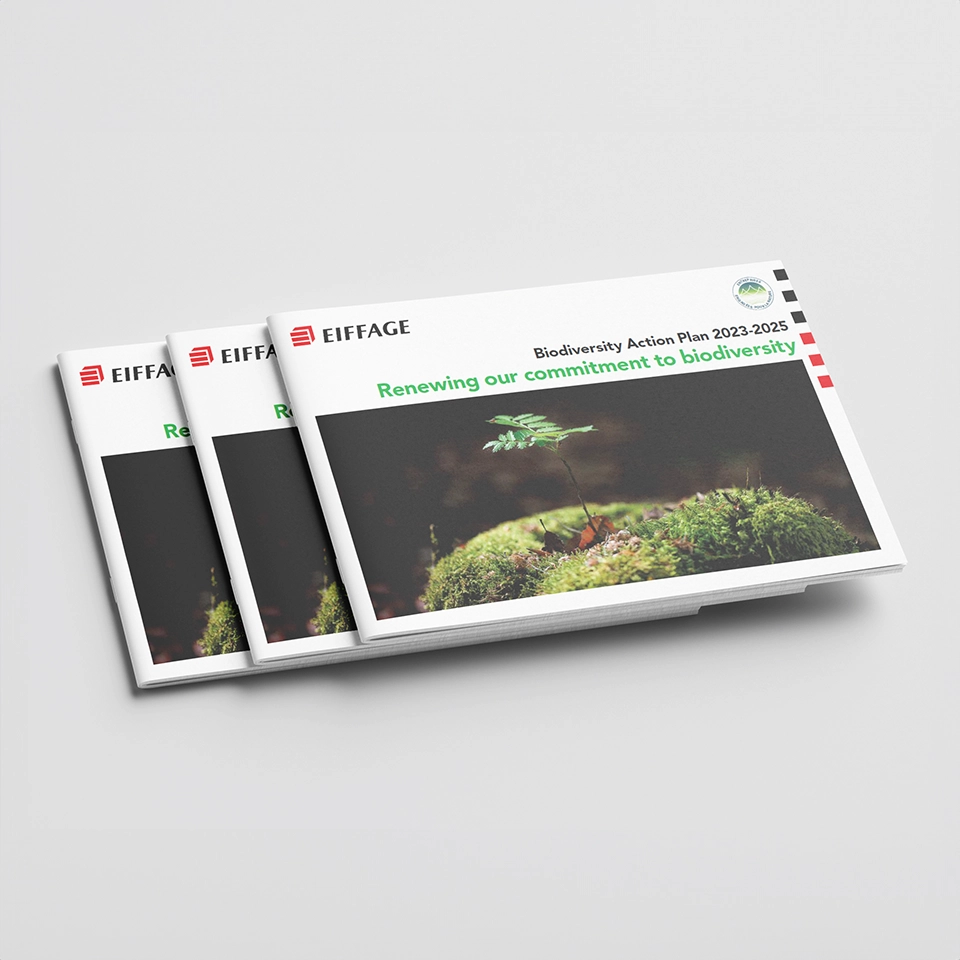Eiffage Group research labs
The two Eiffage Route labs
Eiffage Route researchers, via the labs in Corbas and Ciry-Salsogne, regularly win awards for the innovations they develop as they design the products and processes of tomorrow. Both labs conduct research that is fully focused on the industries and business lines in which the Eiffage Group operates, thereby providing suitable responses for all kinds of projects, including road construction, ports, airports and industrial platforms. They use state-of-the-art equipment to analyse, formulate and develop materials tests. They also provide advisory services regarding technical expertise, design, production methods, quality control and development of specially designed materials for road infrastructure.
The aim is to reduce the environmental impact of roads. By developing green chemistry, using plant-based alternatives to asphalt and deploying procedures for onsite maintenance, the carbon neutral road of the future becomes a reality. For example, Recytal-ARM®, the process for the onsite bioregeneration of road surfaces using plant-based binders developed by the Eiffage Route labs, divides the carbon footprint of the Group’s road projects by 10. Another solution, Biophalt®, helps to reduce the demand for petroleum asphalt by using a sustainable plant-based substitute while also promoting the use of local resources and expanding the circular economy. Biophalt® is the first lowcarbon road, winning the road innovation call for proposals in 2019.
Partnerships with universities and research institutes outside the Group
The I-Site consortium (E3S)
The I-Site Future consortium works on a scientific project to develop the city of tomorrow, bringing together 1,200 researchers and research professors from seven establishments that are members of the Paris-Est University community (Comue): the French Institute of Science and Technology for Transport, Development and Networks (IFSTTAR), the Université Paris-Est Marne-la-Vallée, ESIEE Paris, the Paris School of Urban Engineering, the ENSA Paris-Est School of architecture, the National School of Geographic Sciences (ENSG) and the École des Ponts ParisTech.
As part of E3S, a research programme involving Eiffage and the I-Site Future university consortium, over 25 Eiffage employees and 60 researchers are working together in themed workshops covering all aspects of the sustainable city, including civil engineering, energy, construction, healthcare and sociology. The research covers eight topics – collective regional empowerment, well-being, responsible water management, circular economy, responsible urban worksites, new mobility services, augmented functionality of public highways, and behaviour described and predicted by digital technology.
With a budget of €2 million, the project falls within the Future Investment Programme set up by the French state. It runs alongside the first phase of the project to develop the LaVallée eco-district in Châtenay-Malabry (south of Paris) until 2022.
RWTH – Aachen University
Eiffage has also established a partnership with the Construction Robotics Center (CRC) at Aachen University in Germany, which brings together several European industrial groups (such as Liebherr, Saint-Gobain, Hilti and Autodesk) and draws on the expertise of all the research professors working in the institutes at the university.
The CRC strives to fills the gaps in digital technology used in the construction industry. It innovates across the entire value chain of construction by integrating the full capacity of digital technology through joint efforts to develop key technology in the design of materials, software and processes.
The Ittecop research programme (Land Transport Infrastructure, Ecosystems and Landscapes)
This incentive research programme is led by the French Ministry for the Ecological and Inclusive Transition with the support of the French Environment and Energy Management Agency (ADEME), the Foundation for Research on Biodiversity (FRB) and the Linear Infrastructure and Biodiversity Club (CILB), of which Eiffage is a member.
Its main goal is to confront the technical challenges of LTI (Land Transport - road, rail, river and energy - Infrastructure), and their interfaces with local territories (train stations, ports, airports, etc.) while including issues related to landscape and ecosystems.
The unprecedented move to bring together these organisations made it possible to launch its first call for research proposals in 2014. In light of the success achieved in 2014, the members of the CILB set up another call for proposals in 2017, investing nearly €700,000 in the programme. Another 2021-2024 call for proposals will also be supported by the CILB and Eiffage.
Eiffage Métal, at the cutting edge of innovation in offshore wind
Eiffage Métal is the industrial partner of an ambitious pilot project in floating offshore wind turbines off the Gulf of Lion in the south of France. Developed by Ocean Winds (subsidiary of Engie-EDPR) with the Banque des Territoires (Group Caisse des Dépôts), the Gulf of Lion floating wind farm will be made up of three 10 MW turbines, which is the most powerful turbine ever to be installed on a floater. The floaters, which are currently being designed under the supervision of Eiffage Métal, will be assembled in its yard at Fos-sur-Mer. The turbines will also be delivered here before they are installed at sea just off the communes of Leucate and Barcarès. Floating wind turbines are the future, offering potential that greatly outstrips that of “fixed-foundation” turbines.

